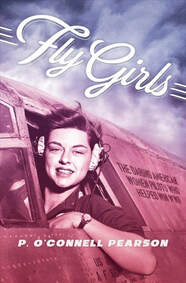
In Fly Girls, P. O’Connell Pearson tells the forgotten story of the women pilots who worked for the military during World War II. In the United States, planes were being produced at an incredible rate, and the army needed them—and fast.
To allow as many pilots as possible to fly in combat, two accomplished pilots named Jacqueline Cochran and Nancy Love proposed a program where female aviators could fly planes from factories to bases. Woman were taking on what were traditionally men’s jobs all over the country, but if a woman wanted to work directly for the military, only specific roles were open. While not all of them consisted of traditionally ‘feminine’ work, many people thought women flying combat planes, particularly the heavy bombers, was going too far.
But women were not afraid to join the Women Airforce Service Pilots (WASP), despite the hard conditions and difficult standards (often much higher than those required of male pilots), and one thousand, one hundred and two of them flew for their country until the program was shut down in 1944.
Fly Girls tells a fascinating story, and one I can’t believe I didn’t know about. More than eleven hundred women worked ferrying planes from 1942 to 1944, and yet this is a piece of history largely forgotten. It also gave me a different perspective on World War II and the suffragettes; how far we have come since then, but also how far we have to go before women will have complete equality with men. The writing is engaging, and it reads like a story, which I for one quite appreciated, as many similar books tend to be on the drier side. I was impressed by the amazing women the story centered around—now forgotten, many battles might have ended differently were it not for the young pilots who risked their lives flying for their country. I would recommend it to readers ages ten and up looking for interesting and inspiring history, about war, planes, and the women who flew them.
 RSS Feed
RSS Feed
